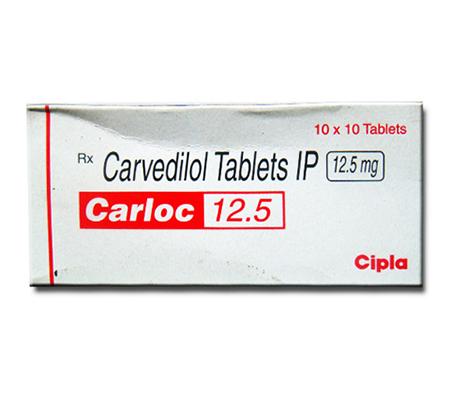Carloc contains Carvedilol, a non-selective beta-blocker and alpha-blocker that is used to treat high blood pressure (hypertension), stable heart failure and angina. Carloc is used to treat a variety of conditions of the cardiovascular system. These include, control of hypertension (high blood pressure) by lowering blood pressure to reduce the risk of complications such as stroke and heart attack; management of stable angina (chest pain) in patients with heart disease, where there is not enough oxygen getting to the heart; chronic but stable heart failure, in conjunction with other medications, by helping weakened heart muscles pump more efficiently. Carloc work through a common mechanism in several different body systems to manage the condition and relieve symptoms by reducing heart rate (pulse), workload on the heart (force needed to pump) and oxygen demand by the heart, which increases blood flow and lowers blood pressure. Carloc contain Carvedilol, which is a non-selective beta-blocker and acts as a beta1 and beta2 receptor antagonist, with some action as an alpha-receptor antagogist. Carvedilol in Carloc works by blocking the action of chemicals called catecholamines, such as adrenaline and noradrenaline (epinephrine and nor epinephrine), which are released by the adrenal glands in response to nerve stimulation during physical and mental stress. Adrenaline works by stimulating beta-receptors in the heart, which increases heart rate and causes constriction (narrowing) of blood vessels. Carvedilol in Carloc blocks the beta-receptors in the heart, to slow heart rate and reduce the force needed to pump blood around the body, which means that the heart needs less oxygen. This action relieves the pain of angina which is caused by increased workload and lack of oxygen to the heart on exertion. Carvedilol in Carloc also blocks alpha-receptors found in peripheral blood vessel walls, and this causes them to relax and widen (vasodilation), reducing the resistance to blood flow. The combined action of alpha and beta blockade by Carloc reduces the force needed by the heart to pump blood and increases blood flow and oxygen to the heart, while at the same time reducing resistance to blood circulating in peripheral vessels by causing vasodilation, which helps lower blood pressure; as well as helping the heart pump more efficiently, thereby reducing feelings of breathlessness on exertion due to weakened heart muscles as in congestive heart failure. You should take your Carloc with a glass of water, once or twice daily, with or without food, unless you are being treated for heart failure then you should take your tablets with food. The dose you take and how often depends on what you are being treated for and your doctor may gradually increase your dose until you reach the optimum dose for your condition. You should continue to take your Carloc for as long as recommended by your doctor, which may be for several weeks or longer and if you are advised to stop taking them, withdrawal should be gradual and treatment should not be discontinued abruptly. The most commonly reported side effects when taking Carloc include: dizziness, headache, feeling weak and tired (asthenia), hypotension (low blood pressure), slow heart beat (bradycardia), weight gain, hypercholesterolaemia (high cholesterol), oedema (water retention with swollen ankles), nausea, diarrhoea, and vomiting, visual disturbances, breathing problems, peripheral pain. Several medications interact with Carloc and should either not be taken while you are taking Carloc or only after discussion and instruction from your doctor. Drugs that cause a serious reaction with Carloc: monoamine oxidase inhibitors (MAOIs) for depression, antiarrhythmics like amiodarone; drugs that affect Carloc: other medicines for high blood pressure; angina or an irregular heart beat such as calcium channel blockers (diltiazem, verapamil, and nifedipine), clonidine for high blood pressure, the antibiotic rifampicin, cimetidine for reflux and ulcers drugs that are affected by Carloc: the immunosuppressant cyclosporine, insulin or metformin for diabetes, digoxin for heart failure. You should store your Carloc below 25°C in a cool dry place, protected from moisture and light






